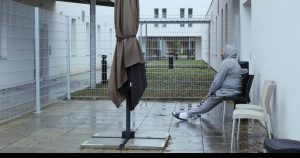FARIDA EL KAFRAWY reviews Raymond Depardon’s documentary, which follows patients at a French psychiatric hospital.
A young man and psychiatric patient sit across from a judge whose responsibility it is to determine whether he will continue to be involuntarily hospitalised, or be released to lead a freer life outside. In France, any patient involuntarily admitted to a psychiatric hospital must have their hospitalisation scrutinised by a judge within 12 days of their arrival, and after that every 6 months. This young man has been at the hospital for a number of years, eight years previously having been deemed not criminally responsible for stabbing a woman 13 times due to his severe resistant schizophrenia. Like many of the patients, he speaks coherently, stressing his knowledge and respect of the law, his difficult life and the effect it has had on his mental health. Cutting off his lawyer mind sentence, he expresses confusion: ‘I’d like to know why people are sick. Why do they all suffer from schizophrenia?’. He addresses his question to the judge, adding ‘I couldn’t have known I had schizophrenia’. It’s a heart wrenching moment, made more emotional by the impossible nature of his question.
There’s still no answer after years of medical research, and that’s what makes Raymond Depardon’s 12 Days so difficult to watch – we empathise with the patients who feel their lives are slipping away in the unnaturally white hospital, with safety belts on their beds and only a small area to walk outdoors with fences surrounding them. They have no control over their mental state, and for some, medication is clearly unsuccessful in stabilising their condition. The patients have varying levels of awareness of their mental illnesses, from acceptance to absolute denial, and we as an audience do not want to believe that our lives could ever have been like the ten patients we get to know on screen. Behind the empathy and compassion, there is a deep anger at the traumatic experiences some of them have faced and a sense of fear – perhaps the same fear that drives the stigma surrounding mental illnesses.

The scenes that focus on the interaction between patient and judge are intense, but Depardon shifts in between the cases for short intervals to survey the corridors of the hospital, and the small space outside. Relief comes in the form of Alexandre Desplat’s solemn yet peaceful original score. In these moments the breadth of symptoms patients display are briefly represented. Behind a closed door, we hear a woman speak intermittently in two different voices, yelling for the doctors. ‘The demons have me on the floor! They’re torturing me! They’re making me bang my head!’; this scene is later contrasted by a woman who walks back and forth in the corridors, alone, repeating the words ‘I love you so much. I’m thrilled to see you. Thank you enormously. And God bless you’ in a heartfelt endless loop. Depardon does well to avoid stereotypes in his documentary, sensitively depicting people with mental illnesses struggling to exist in society. Yet ultimately, out of the ten cases we watch on screen there is not a single case in which the judge deemed involuntary hospitalisation to be unnecessary – only one case is called for further inspection, and the rest of the patients are informed that the doctors deem it vital that they continue as in-patients.
All but one of the patients want to leave the hospital for various reasons. One wants to see her child more often, acknowledging that she cannot have her all the time, but pleading with the judge to recognise her ability to tend to her daughter’s needs. Another just wants to leave ‘to jump from the third floor [of her apartment] and die’. For all the patients, what is evident is the presence of an paralysing pain, and we can’t help but wonder whether anyone’s sanity could have withstood the horrors these people have seen and experienced in their lives.

With Desplat’s solemn original score in the background, the film closes with shots of Lyon shrouded in a thick bluish fog, illustrating the emotional smog that clouds the minds of the patients in the hospital. 12 Days portrays the hard reality of life in a psychiatric hospital, and is gut-wrenching and difficult to watch at many points. The instability and inconsistency of some patients is unsettling, yet the film is encapsulated within the first couple of minutes, as the camera meanders through the empty hospital corridors. 12 Days demands that we recognise how deep the stigma surrounding mental illness is; like the closing shots of the film, our perceptions of mental health are shrouded in a deep, thick smog which must be lifted. Depardon’s candid documentary is designed to clear this figurative fog, and lead its audience to a more nuanced understanding.
Featured image courtesy of festival-cannes.com





